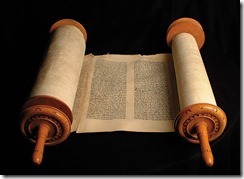Michael Jensen [bold emphasis mine – RAS] [SOURCE]
 One of the greatest and most enduring slogans of the Reformation is sola scriptura (‘scripture alone’). The slogan brilliantly encapsulates the Protestant insistence that the church and its traditions are to be subject to Scripture, and not the other way around.
One of the greatest and most enduring slogans of the Reformation is sola scriptura (‘scripture alone’). The slogan brilliantly encapsulates the Protestant insistence that the church and its traditions are to be subject to Scripture, and not the other way around.
The Reformers insisted that human traditions, even under the Holy Spirit’s guidance (as far as that could be discerned), did not have authority to supplement, augment or overturn Scripture. To establish saving truth, what was needed was a return to the authoritative sources – to the Scriptures themselves.
And this was not something over which Church authorities had a monopoly. The Bible was addressed to every Christian. Every Christian possessed the Holy Spirit, and may read the Scriptures and come to faith in Christ.
But let’s be careful here. I often hear even experienced and well-trained Christians confuse sola scriptura with solo or nuda scriptura. That is: ‘scripture alone’ is confused with ‘scripture only’ or ‘scripture undressed’.
Let me explain. It all has to do with tradition. Now, as the descendants of the Protestant Reformation, we are used to treating the concept of ‘tradition’ with a great deal of suspicion. We know that the Roman Catholic Church misused this concept – and that it lost its ability to be self-critical of its own doctrines and practices.
But the Reformers still held the idea of tradition with a great deal of reverence. And if you read a Calvin, or a Luther, you will see they accorded the continuous tradition of orthodox teaching a great deal of weight – insofar as it matched up with Scripture. In the Middle Ages, before the Reformation, there were two concepts of tradition in circulation, which historians have labelled ‘Tradition 1‘ and ‘Tradition 2‘.
Tradition 1 was the teaching that doctrine is grounded on Scripture and tradition is the ‘traditional way Scripture has been interpreted’.
Tradition 2, on the other hand, was the teaching that Christian doctrine consists of Scripture plus unwritten tradition.
At the Reformation a third view emerged – ‘Tradition 0‘ – which held that there was no role whatsoever for tradition in Christian teaching. But it was not the Reformers – Luther, Calvin, Zwingli and Cranmer – who held this view. They were indeed concerned to eliminate any human distortions to the witness of Scripture, and to place the authority of the Church very much under the authority of Scripture. But the tradition of Scriptural interpretation – provided it could be justified – provided a weighty if not decisive authority in matters of theological understanding.
Tradition 0 (or nuda scriptura) was the position of the Radical Reformation, the ‘Anabaptists’ – who argued rather (as far as we can tell) that every individual had the right to interpret Scripture for him or herself. Private judgment of the individual – or of the small sect – is thus placed over the corporate judgment of the Church. And so, there were those such as Servetus and Socinus, who, on the basis of Scripture, argued against such orthodox norms as the Trinity. (The Jehovah’s Witnesses do this in our own day).
For their part, the ‘magisterial Reformers’ (as they are called) were certainly loath to endorse this kind of use of Scripture. For them, the early Fathers of the church were often faithful and insightful expounders of the Scriptures – especially Augustine and Chrysostom. And so, it was appropriate to listen to this tradition of interpreting the Bible for guidance. It was appropriately humble to reckon with the testimony of Christians in other times and places, given our tendency to misread to our own advantage.
It was right for the Christian to seek wise counsel from skilled, trained and faithful interpreters of the text – so long as these interpreters were themselves subject to the authority of Scripture. It was proper to see that tradition had served in many cases (such as in the person and work of Christ) to bring the teaching of Scripture into sharper focus, or to show how it coheres in particular ways. The doctrine of justification by faith was not in this sense a novelty.
What does this mean for evangelical Anglicans (and other inheritors of the Reformation) today? Scripture is the final authority to which all Christian thinking must be subject. However, it’s either arrogant or simply naive to imagine we are the first readers of Scripture, or that we can or should read it without reference to that tradition. And if a reading of Scripture is proposed that breaks with the witness of the tradition of faithful Christian readers down the two millennia of its being read, we do well to hear alarm bells ringing.
Leave a Reply
You must be logged in to post a comment.